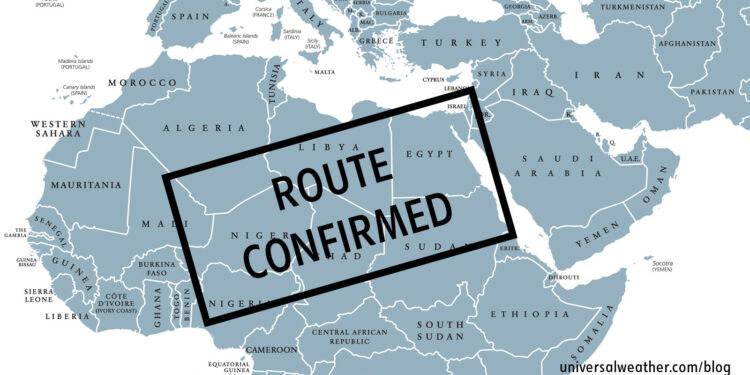BizAv Ops to Northern Africa: Part 1 – Regional Considerations

This business aviation blog post is part of a series on operating to Northern Africa.
Northern Africa has received a lot of news recently, and this region remains in a state of change from political, economic and security perspectives. Still, many operators have needs to take their aircraft to this part of the world for business purposes. Trips to this area can be reliably and successfully put together, assuming adequate pre-planning and close coordination between your 3rd-party provider and local ground handlers.
The following is an overview of what you need to know:
1. Northern African region
The United Nation definition of the northern region of Africa includes seven countries – Algeria, Egypt, Libya, Morocco, Sudan (north and south), Tunisia, and Western Sahara. This region has many natural resources – including petroleum, natural gas, minerals, iron ore, etc. – and is frequently a general aviation (GA) destination. GA operations here, generally, are for business purposes. Technical stops in this region are not as frequent as they used to be, due to security concerns and changing political climates. There are, however, several good fuel uplift locations to consider within the region.
2. Popular stops
Morocco continues to be a popular GA destination, with flights to Casablanca (GMMN), Marrakech (GMMX), Tangier (GMTT) and other locations. For Egypt, despite recent political turmoil, travelers from all over the world still visit Cairo (HECA), Alexandria (HEAX) and Luxor (HELX) for both business purposes and to experience the country’s rich history. Tunisia, located at the eastern end of the Atlas Mountains and the northern reaches of the Sahara desert, is a dramatically beautiful country with wonderful architectural heritage. Algeria, due to its lack of accommodations, is not as popular a destination for GA operators as the other neighboring countries –, but this will evolve. GA visits to Sudan and South Sudan are somewhat rare occurrences at the moment due, mostly, to the political situation and sanctions needed. Western Sahara suffers from a lack of tourism, as well as business-related GA activity, as a result of ongoing territorial disputes and independence movements that can be violent at times.
3. Top considerations
Top five items to consider when planning trips to this region include:
- political/economic/social climate
- fuel availability
- reliability of communications
- suitable accommodation and local transport options
- the northern African terrain and weather
- permit requirements
4. Importance of these considerations
Political, economic and social climates are important considerations as current events can make trips to this region a security concern. Uprisings and riots can put passengers, crew and aircraft at risk. Fuel availability may be an issue, especially for tech stops and during periods of civil unrest. It’s best to confirm in advance if fuel is available and to always carry a fuel release. Unreliable communications can frustrate even the most understanding. It may be difficult, at times, to communicate with your ground handlers. Always ensure you have cell phones with international capability and consider taking a satellite phone as backup. Lack of suitable hotels, in some areas, may make it necessary to reposition the aircraft in order to source adequate accommodations. Geographically, this region is composed of desert as well as the Atlas Mountains, with peaks at over 13,000 feet. Blowing sand can be an issue to consider at some airport locations. Also, it’s important to ensure that all needed permits are in place. With each of these countries there are differing requirements that must be met prior to permits being approved.
Conclusion
It’s important to ensure that you have contingency plans in place when traveling to the Northern African region. While most GA trips to this area go smoothly, on time and are incident free there’s always potential for things to go sideways when you least expect it.
Questions?
If you have any questions about this article or would like assistance planning your next trip to northern Africa, contact me at marcellaklauser@univ-wea.com.
Stay tuned for Part 2, which covers more considerations for travel to Northern Africa.




